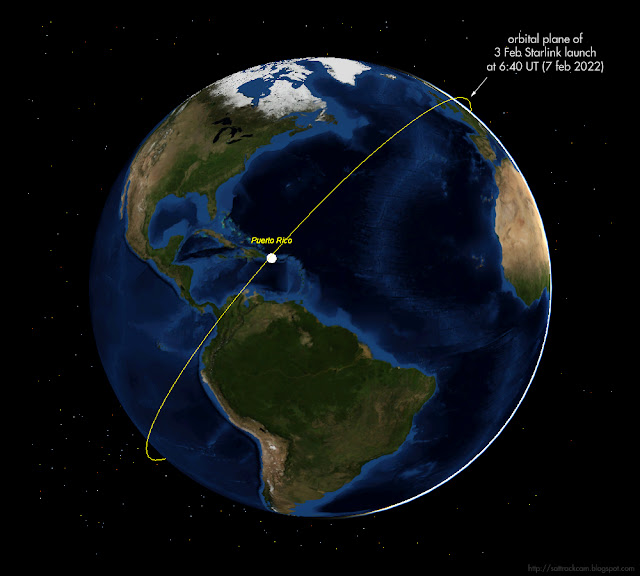The spectacular image above is a frame from video footage obtained by
cameras at Añasco, Puerto Rico, part of a cameranetwork from the Sociedad de Astronomia del Caribe (SAC). It was shot on 7 February
2022 near 6:40 UT (2:40 local time) and shows what clearly is a satellite reentry, the reentering satellite spectacularly breaking up into many fragments.
Below is the actual video. It shows two objects appearing
about 1 minute apart, both reentering and fragmenting. Especially the
second object is spectacular. The two objects could belong to one object that has broken up earlier; or be two separate objects close together in the same orbital plane.
The reentering object(s) can be identified as belonging to a batch of 45 49 Starlink satellites launched on 3 February 2022, two-and a half days before the reentry sighting from Puerto Rico.
A day after the launch, when most of the deployed satellites yet had to raise their orbits, a Coronal Mass Ejection (CME) from the Sun arrived at earth, creating a geomagnetic storm.
During a geomagnetic storm, the upper atmosphere warms up and expands somewhat, causing an increase in drag in low orbital altitudes. SpaceX therefore put their just launched satellites, still in a very low orbit, into safe mode and a least-drag attitude.
This however prevented them from raising their orbits, and it did so long enough to make it impossible for some 40 of them to be rescued. Over the past days a number of them (at least three, possibly more, including the object over Puerto Rico, at time of writing (9 February 16:00 UT)) have already reentered and the other objects, some 40 in total according to SpaceX, will reenter over the coming week.
Fourty (40!) satellites reentering in only a week or so, is unique. The coming week, the chances of seeing a satellite reentry are therefore larger than usual for anyone between 53 N and 53 S. So keep an eye on the sky!
 |
| screenshot of Feb 8 announcement on the SpaceX website |
Though it remains to be seen which of the 40 satellites it actually was, the Feb 7, 6:40 UT, Puerto Rico sighting can be possitively linked to this deluge of decaying Starlink satellites.
One clue is that the orbital plane of this launch was over Puerto Rico near the time of the event, and the direction of movement (SW-NE) matches it.
To get even more certainty, I did some astrometry on the footage and fitted a rough circular orbit to the measured positions.The rough orbital fit I get - I measured three fragments- yield orbital inclinations in the range of 54-56 degrees: Starlink satellites are in 53.2 degree inclined orbits, so this is close enough (given the error margin) to conclude that the reentering object fits with the Starlink orbital plane. The RAAN values also match to a degree or so. So there is very little doubt that this was a Starlink satellite reentering.
One reason why I checked this, is that someone suggested another candidate, a Falcon 9 rocket stage from a 2017 launch (2017-014B), which was also expected to reenter around this date (in fact it had already reentered a day earlier) and had its orbital plane passing over Puerto Rico at the time of the event. This rocket stage however had an orbital inclination of 22 degrees, which is clearly much lower than what I get for the reentering object in the footage.
Starlink satellites are not very big and do not have big rocket engines, so there is very little chance that anything remains and reaches Earth surface from these reentries: it will all burn up in the atmosphere.
Note: I thank Eddie Irizarry for alerting me to the Puerto Rico event
UPDATE 17:30 UT (9 Feb 2022):
For some 21 of the 45 49 Starlink satellites in question, orbital elements have now been released by CSpOC. A quick assessment with SatEvo suggests reentries happening over the coming week, up to mid-February.


Over Fort Collins, CO this morning at about 5:45am I witnessed a fireball like object what seemed moving somewhat more horizontal (compared to a meteor based on it's rate of speed). It was very bright, much brighter than the brightess star or planet by probably 10x. After it's peak brightness it disintegrated, at one point an ember like piece split off and then it was gone. Probably lasted around 5 seconds from the point I saw it. I assume it was one of the Starlink satellites.
ReplyDelete